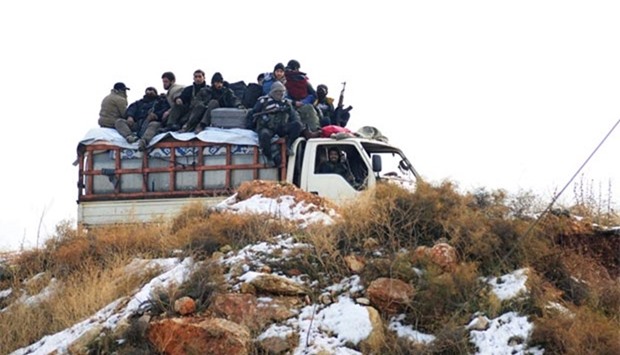More than 4,000 fighters left rebel-held areas of Aleppo, the Red Cross said on Thursday, in the "last stages" of an evacuation clearing the way for Syria's army to retake the city.
A week into the rebel withdrawal from the east of Syria's second city, the evacuation of fighters and civilians from the one-time opposition stronghold appeared to be reaching its final hours.
The loss of east Aleppo marks the biggest defeat for Syria's rebellion in more than five years of civil war and a major victory for President Bashar al-Assad, who on Thursday hailed his allies Moscow and Tehran.
"The liberation of Aleppo is not only a victory for Syria but also for those who really contribute to the fight against terrorism, notably Russia and Iran," state news agency SANA quoted Assad as saying.
The evacuation effort has been hampered in recent days by heavy snowfall and freezing temperatures -- leaving evacuees waiting in unheated buses for hours -- but aid workers said it had resumed in earnest.
"Overnight between Wednesday and Thursday, in one of the last stages of the evacuation, more than 4,000 fighters were evacuated in private cars, vans, and pick-ups from eastern Aleppo," said Ingy Sedky, the spokeswoman in Syria for the International Committee of the Red Cross.
She said about 34,000 people had left rebel areas of Aleppo under the evacuation plan, which the ICRC is assisting with.
Evacuations 'probably' into Friday
The heavy snowfall from the day before, which blanketed Aleppo and the surrounding countryside, had stopped but was still slowing down the evacuations.
"The bad weather, including heavy snow and wind, and the poor state of vehicles... mean things are moving much more slowly than expected," Sedky said.
"The evacuation will continue for the entire day and night and most probably tomorrow (Friday). Thousands are still expected to be evacuated."
It was unclear who exactly remained to be evacuated or how many were either fighters or civilians.
The United Nations said it had deployed observers to monitor the final evacuations, under a Security Council resolution adopted on Monday.
Jens Laerke, spokesman for the UN humanitarian agency, said 31 staff had been assigned for monitoring at the crossing point at Ramussa, the government-held district of southern Aleppo through which evacuation convoys have been leaving.
"It's been a very difficult night. The weather is really harsh, and people are leaving in hundreds of private vehicles at different levels of disrepair," he told AFP.
Rebel forces, who seized control of east Aleppo in 2012, agreed to withdraw from the bastion after a month-long army offensive that drove them from more than 90% of their former territory.
Pivotal moment of war
The agreement was brokered by Russia, which launched air strikes in support of Assad's regime last year, and Turkey, which has supported some rebel groups.
An AFP correspondent early on Thursday saw a convoy of about 20 pick-up trucks and cars carrying armed rebels pass through Ramussa. A few hours later another convoy of about 10 buses also left.
An AFP journalist on Thursday also saw buses headed for Aleppo carrying residents who are being evacuated from rebel-besieged villages.
As part of the Aleppo evacuation deal, it was agreed some residents would be allowed to leave Fuaa and Kafraya, two Shia-majority villages in northwestern Syria that are under siege by the rebels.
About 1,000 people have been able to leave the villages in recent days.
Sedky said the ICRC would "continue to escort hundreds of civilians" from the villages to Aleppo "throughout the day".
The evacuation of Aleppo's rebel sector is a pivotal moment in a war that has killed more than 310,000 people and triggered a major humanitarian and refugee crisis.
As well as a major strategic gain for Assad, the rebel withdrawal from Aleppo has given fresh impetus to international efforts to end the conflict.
Russia, Iran and Turkey agreed this week to guarantee Syria peace talks and backed expanding a ceasefire, laying down their claim as the main powerbrokers in the war.
Turkish air strikes
Repeated attempts at peace have failed, but UN envoy Staffan de Mistura has said he hopes to convene fresh talks in Geneva in February.
Moscow's military intervention in support of Assad marked a major turning point in the war.
Defence Minister Sergei Shoigu said on Thursday the Russian air force has killed 35,000 fighters in Syria since it began in September last year.
Turkey launched its own campaign in Syria in late August in support of pro-Ankara rebels, with the aim of ousting Islamic State group jihadists as well as Kurdish militia from areas near its border.
Turkish air strikes killed at least 29 civilians including eight children on Thursday in the IS-held town of Al-Bab, which Turkish forces have been seeking to capture for weeks, the Syrian Observatory for Human Rights monitoring group said.
The raids came a day after 14 Turkish soldiers were killed by jihadists around Al-Bab, in the country's biggest loss of the campaign so far.
Prime Minister Binali Yildirim vowed on Thursday to press on, saying: "Turkey is in the midst of a great struggle -- our fight against terror continues both in our country and outside our borders."

Syrian rebel fighters are evacuated from Aleppo on Thursday.
